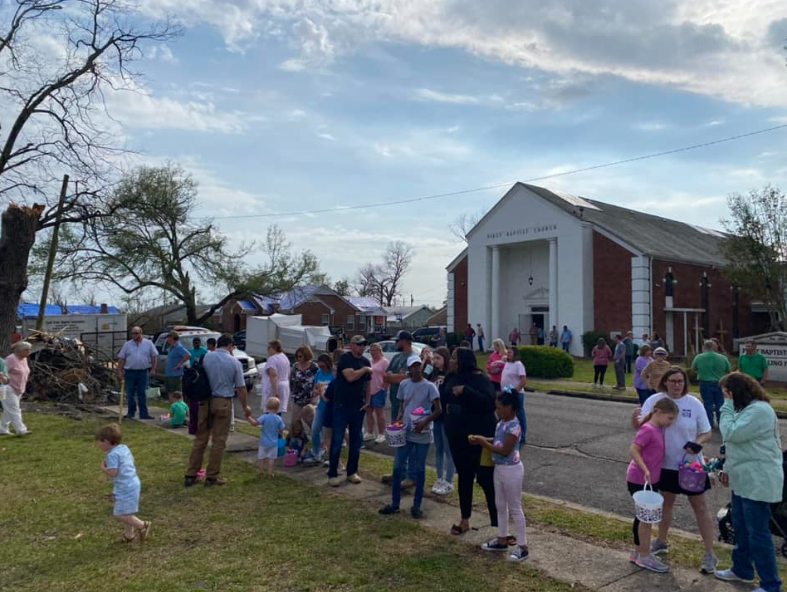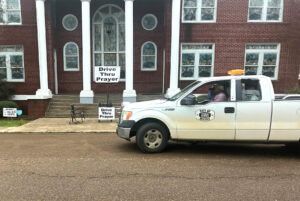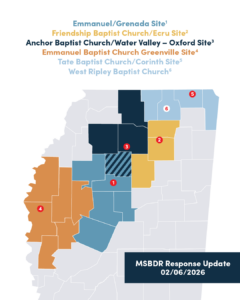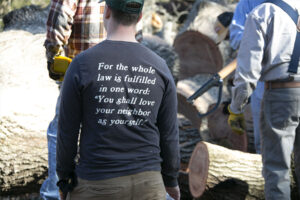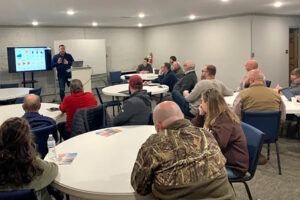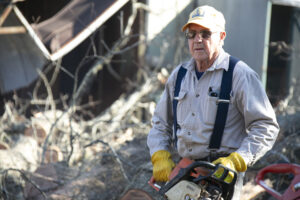By Lindsey Williams
Writing Specialist
On Friday, March 24, 2023, at 8:08 p.m., an F4 tornado unexpectedly formed just eight miles from town. Only eight minutes later, the mile-wide tornado tore through the center of Rolling Fork, a city 1.4 miles wide. Out of 493 residences, 250 were reduced to rubble that night, and another 70 houses were so damaged they had to be demolished. Forty businesses were completely destroyed.
Yet, that Sunday morning, First Church Rolling Fork was filled with worshipers. Nineteen families had lost their homes, cars, and possessions, but they found their way to the church. Amid their own losses, the church sought to minister to the community. Britt Williamson, pastor of First Rolling Fork, recalled the church’s response, “With the help of Mississippi Baptist Disaster Relief, we’ve been able to transform our church, within a hundred yards from where the tornado was, for relief efforts. God left these buildings, that He owns, standing, and we’ve been able to use our church to house volunteers.”
“As part of our church’s ministry to the community’s immediate needs,” said Williamson, “we discovered there was a huge population of renter families here. When I moved here in 2012, I knew that the Delta was a poverty-stricken area, but I didn’t know until after the tornado just how many people were renters. Forty percent of those dwellings were renter-occupied homes, but in that 40%, we had 68% of our population. With all the homes destroyed, those renters were displaced. They spent months in hotels in Vicksburg, Yazoo City, Greenville, and had nowhere to come back home to.
“The way real estate is priced here, the people who invested as rental property owners usually paid $50,000 to $60,000 for a house. The average rent here was about $500. Now that home is destroyed, so if you are a rental property owner and you have a $90,000 insurance payment on that home that you had bought as an investment, now it’s going to cost you $200,000 or $300,000 to build a new home. You can’t afford to charge $500 a month for rent anymore, so there are zero rental houses that were destroyed that will be rebuilt.
“I did a lot of research on how much help renters can get after disasters, and what I discovered is that 99.9% of all help flows to the homeowners,” Williamson explained. “Homeowners can get money from their insurance, from FEMA up to $40,000, a grant up to $40,000 from the USDA, and they can even get a loan for two and a half percent from the SDA. The only thing a renter can get is an initial payment from FEMA, which is about $4,000 to $8,000. That doesn’t last long when you have lost everything and you, your husband, and four kids are living in a hotel. The only other program for a renter was from the USDA, where a renter can buy a home, and there are no houses they can buy in Rolling Fork, or that renter can build a home.
“The criteria to qualify for that program was 20-something pages long, and the last criteria was that you had to have a 640 or better credit score. So if I put a hundred renter families in Rolling Fork through that funnel, maybe one or two would qualify.
“In other words, for our context, there was no help for renting families,” Williamson stated. “So we met with families, we prayed with them, we shared the Gospel with them, and we would give them the financial help that we were given. Every family told us that the owner of their rented house had no plan to rebuild, and that they wanted to come back to Rolling Fork because, ‘This is my home, this is where I’m from, this is where my family’s from, and this is where I want to live.’ So that’s when we started to put together our nonprofit, Rolling Fork Rising, to build homes – new homes that we would sell to them at a discounted rate in an effort to bring families back to Rolling Fork. If we lose 50% of our population, it’s going to affect our churches, our schools, our businesses – it’s going to affect everything. So we asked, ‘How can we minister to these families in an effort to not only bring them back to Rolling Fork, but to help bring them out of multi-generational poverty?’ That’s how Rolling Fork Rising was born.
“Right now, we have 73 families in our program, six houses under construction, and six families already assigned to those houses. When they are completed, the families will be purchasing those houses. Our program is designed so that these families have to complete several classes, because when it comes to multi-generational poverty, there’s usually a lack of education.

“In order for them to receive an application to be considered to purchase a home, they have to take these classes. One is called a Foundation of Hope class, which I personally teach, and it lays out the groundwork of who we are as a nonprofit, our goals, and our expectations for the families and how they can get to the finish line and buy a house,” Williamson said. “Then they take two three-hour financial literacy classes, which teach the basic elementary principles of finances. Then they take a three-hour homeowner class, which explains the different responsibilities between being a homeowner and being a renter, and the maintenance schedule required to maintain a house.
“Our desire is to keep their total payment at $600 or less because that was the top rental price in Rolling Fork before the tornado. We designed our mortgage process where our nonprofit is owner-financing the properties. We give them a 20-year mortgage at 0%. So everyone’s payment will be $600 a month. The mortgage amount will come out, and the rest will go into their escrow account to pay the land tax and to pay for their homeowner’s insurance.
“The final requirement for families is three one-hour counseling sessions with qualified counselors. Everyone here has some level of post-traumatic stress,” Williamson noted. “What we’re trying to do is take a holistic approach so that as a family moves into a new home, they will be on the road to being healthy – mentally, emotionally, and spiritually. Our whole process is infused with the Gospel so that every step, they’re encountered not only with the love of Christ but the message of Christ. We can’t force anybody to become a believer, but they will have many opportunities to see and hear the Gospel as they go through our program.
“It’s been an incredible process to see how God has moved and how He has worked to take this vision, make it a reality, and just provide volunteers who have come from all over the country to work on the houses. We’ve had volunteers from New Hampshire, Massachusetts, Minnesota, Kentucky, Missouri, Arkansas, and Mississippi. God’s providing the funding. We own 20 lots inside Rolling Fork already, and we also own 18 acres inside Rolling Fork.
“We’ve seen a man about 27 years old who had never had a job before, but he went and got a job as part of going through the process. We’ve seen people open up bank accounts who had always cashed their checks at the liquor store. We’ve received tremendous positive feedback as people thank us for investing in them.”
In his appeal for support from Mississippi Baptists, Williamson shared, “You can help us first by praying for us. Our community is still struggling. Pray for the many families who are still displaced. Pray that the families in our city would be healed from that traumatic experience. We had 13 deaths that night. We had three more people die in the days and weeks after, from injuries they sustained. So we’ve had 16 total deaths. Any death is too many, but there should have been 500 people to die that night. It was only by the grace of God that it was not more, because hundreds of people didn’t know the tornado was coming – we had little to no warning.
“Pray also that volunteers will continue to come to our community to help us rebuild, whether it’s for a homeowner or for a renter. We need volunteer labor because that helps us keep the cost of houses down at Rolling Fork Rising. Pray that God will continue to lead us, give us wisdom, and provide for us. People ask me all the time how many houses Rolling Fork Rising wants to build. My answer is, we’re going to build as many houses as God gives us money and volunteers to build. God has been faithful and has given us a lot of provision in those two areas. You can also pray about God using you to help fund part of a house, all of a house, or if you are a business owner who can help us get discounted materials. We need funds, too – there are certain things you can’t have volunteers do, like plumbing, electrical, or the HVAC. And pray about God leading you to be a part of a volunteer group to come over and help us rebuild.”
Over time, relief projects can be forgotten, and the outside world often fails to remember the trauma of a community. Help spread prayer-awareness.
Pray for the congregation of First Rolling Fork, which still wrestles with the loss and trauma of last year. Pray also for Britt Williamson and his family, the 19th family of the church to lose everything. They are currently living in a parsonage and taking the daily steps necessary to heal as a family. Six days before the tornado, Williamson’s wife suffered several strokes. But Williamson praises God because, a year later, his wife is almost 100% better. God is healing.
For more information about Rolling Fork Rising, how to donate, or how to sign up for volunteer work, visit Rolling Fork Rising: Rebuilding Homes, Restoring Hope.
To learn more about Mississippi Baptist Disaster Relief and for contact information, visit the Mississippi Baptist Convention Board website at mbcb.org.
This story of resilience, community support, and faith highlights the enduring spirit of Rolling Fork and its residents. Through the collective efforts of volunteers, the dedication of Rolling Fork Rising, and the prayers of many, the community is making strides towards recovery and rebuilding, one home at a time. As they face the challenges ahead, the strength and unity of Rolling Fork serve as a testament to the power of hope and collaboration in overcoming adversity.

